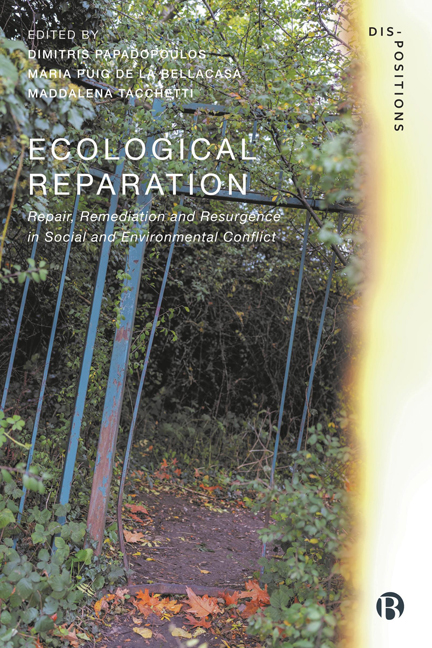Book contents
- Frontmatter
- Contents
- List of Figures
- Notes on Contributors
- Acknowledgements
- Note on the Figures
- Dis-Positions Series Preface
- Introduction: No Justice, No Ecological Peace: The Groundings of Ecological Reparation
- PART I Depletion<>Resurgence
- PART II Deskilling<>Experimenting
- PART III Contaminating<>Cohabiting
- PART IV Enclosing<>Reclaiming Land
- PART V Loss<>Recollecting
- PART VI Representing<>Self-governing
- PART VII Isolating<>Embodying
- PART VIII Growth<>Flourishing
- Index
14 - ‘Obedecer a la Vida’: Environmental Citizenship Otherwise?
Published online by Cambridge University Press: 28 March 2024
- Frontmatter
- Contents
- List of Figures
- Notes on Contributors
- Acknowledgements
- Note on the Figures
- Dis-Positions Series Preface
- Introduction: No Justice, No Ecological Peace: The Groundings of Ecological Reparation
- PART I Depletion<>Resurgence
- PART II Deskilling<>Experimenting
- PART III Contaminating<>Cohabiting
- PART IV Enclosing<>Reclaiming Land
- PART V Loss<>Recollecting
- PART VI Representing<>Self-governing
- PART VII Isolating<>Embodying
- PART VIII Growth<>Flourishing
- Index
Summary
Obedecer a la Vida (Obey Life, Abide by Life) was the expression Roberto Saenz used when referring to what made him feel and think. This is the way he expressed his commitments to the Tenasuca Lagoon (located in the Tequendama Andean Cloud Forest of Colombia); to his colleague Arnovis, who worked every day in agroecology; and to his private nature reserve and small organic market. In addition, he added, “I do not practice civil resistance. I obey life.” Roberto’s statement struck me deeply and led me to think about the different ways of considering emergent practices for repairing a certain place. These practices respond to what the situation demands in the face of changing ecological and social conflicts. However, in my interpretation, Roberto’s practice doesn’t follow the same framework as the nation-state’s liberal environmental policies – at least, in Colombia. What kind of environmental-oriented action are we talking about? How does the statement ‘obey life’ relate to concrete practices in the field of agriculture? And then, how does this practice differ from other ways of practicing a policy that addresses nature conservation? These are some questions I will unravel in this chapter. My aim is to elucidate whether liberal citizenship can promote and support ecological reparation. More broadly, I wonder if the liberal framework of political thought is the only way in which the current environmental crisis might be addressed. Colombian nature conservation policy has centred on the production of discourses, knowledge and subjectivities that aim at, on the one hand, overcoming the negative effects of development, and on the other, securing strategic ecosystems in terms of biodiversity. However relevant these efforts are, biodiverse ecosystems are still valued under a utilitarian logic based on capitalist profit-making. In this sense, sustainable development discourses are articulated within liberal societies’ economic structure.
To this end, I will narrate the story of agroecological practitioners in the Tequendama region of Colombia, aiming to elucidate how their practice explains what ‘obey life’ means. If the liberal framework is based on the notion of rights and obligations (and its cognate notions, namely, individuality, universal thinking, self-interest and antagonism among political actors), ‘obeying life’ seems to follow another framework.
- Type
- Chapter
- Information
- Ecological ReparationRepair, Remediation and Resurgence in Social and Environmental Conflict, pp. 208 - 222Publisher: Bristol University PressPrint publication year: 2023

